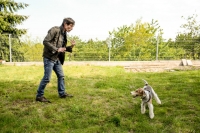“Maybe we should mention a thing that is overlooked, and that is not only the students' participation in November 89, but students' participation in the fundamental changes after 89. By this I mean the student strike and the strike of artists in 1996 and 1997 in response to the unfathomable practices of the Minister of Culture Hudec and so on. At that time, an open forum Save the Culture was created, which resulted in a memorable occupation strike of the Ministry of Culture, where several very funny and curious situations occurred, apart from the fact, that Minister Hudec ran away with a coat on his head. The cops tried to drag us out of the ministry. I remember being terribly afraid. I was scared, I'm afraid of physical violence. I'm no Rambo.We were sitting on the stairs, holding each other under our arms, thus creating a chain. And I just asked, whether those sitting on either side were heavy enough, because there was about a 50 kg cop there, but I calmed down, that he won't be able to drag three of us. There have been two events that should have been recorded: The magic of the unwanted. As Števa Kožka was dragged up the stairs, that shot, which later appeared on television, the cops dragged him by the arms and legs, came from a camera previously confiscated from a Markiza, which was set to automatic regime.The cameraman came to the policeman with a plea to give him the camera. The policemen agreed, but the cameraman had to hand over the tape. This type of camera, however, had a storage for clean tapes on the back, so the cameraman gave him the empty one, and the footage staid in the cartridge. They immediately run to VSVU to copy the tape, there were some deputies, with deputy immunity in the footage, which was sent to Czechia, Austria etc. It is also related to the second event- next to the concrete pot in front of The Ministry of Culture stood Pavol Rusko in a tracksuit, he was the director-in-chief of television Markiza. Meciar was the witness at his wedding, and who as an eager communist regretted he missed November 1989. He came to the conclusion, this is the new 1989, and immediately stopped the broadcast of Anka Ghanamova, he published the footage from the strike and the pro-Meciar Rusko immediately became a liberty-loving, democratic citizen."

